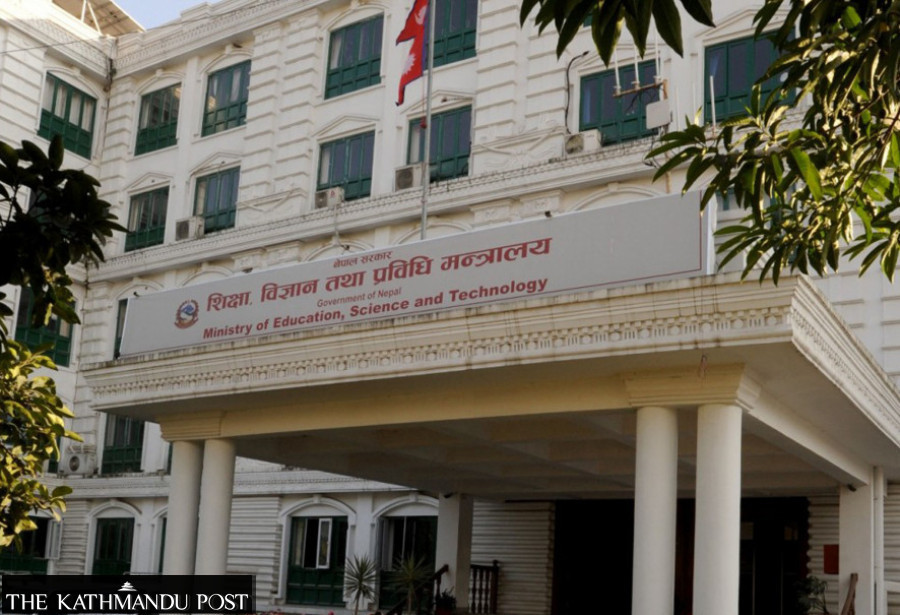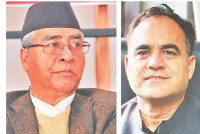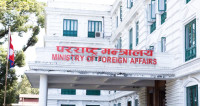National
Ministry to tighten foreign affiliations of Nepali colleges
Move aimed to ensure that colleges affiliate only with top 1,000 universities and institutions in world rankings.
Post Report
The Ministry of Education, Science and Technology has decided to amend the directives to regulate the colleges with foreign affiliations in line with the suggestions from two expert panels.
A meeting of the Central Monitoring and Evaluation Committee on Sunday formed a committee chaired by a joint-secretary at the ministry to move ahead with the amendment process. The committee, which will have representatives from the ministries of finance and law, will proceed with the amendment incorporating the suggestions from the expert panels.
Two separate panels led by former secretary Shankar Koirala and Binil Aryal, dean at the Institute of Science and Technology, Tribhuvan University, were formed to study the operation and performance of such colleges. Both reports claimed that most of these lack quality and have not been abiding by the existing laws.
The panels said the government should permit only those colleges that are affiliated to a university listed among top 1,000 in global rankings. Only eight of the 59 colleges have affiliations from the universities placed within 1,000 in the Times Higher Education World University ranking.
While the Koirala-led committee was formed by then education minister Sumana Shrestha, incumbent minister Bidya Bhattarai constituted the Aryal-led panel. Both the panels suggested revising the directives to amend the affiliation criteria, student admissions, quota system and scholarship. The existing rules provision that colleges can operate with a foreign affiliation given that the affiliating universities are either listed among top 1,000 or have received quality assurance accreditation.
The college managers, however, have been raising questions over the impartiality of the expert panels. “A majority of the Aryal-led panel are the professors from a university that is our competitor. We fail to accept its recommendations as fair,” Laxman KC, chairperson of the International Education Providers Association, Nepal, told the Post. “We object to the ministry’s act of moving ahead to amend the directives without consulting with us.”
The association has even challenged the government’s move in the Supreme Court. Close to 30,000 students had enrolled in these colleges until the previous academic year. These colleges offer bachelor’s and master’s programmes.
In India, only those foreign institutions that figure in the top 500 of global ranking by Times Higher Education World University Ranking or Shanghai Jiaotong university can affiliate Indian colleges.
The expert panels, claiming that most of such colleges were running haphazardly in Nepal, have stressed that proper regulation is necessary to ensure their quality of education. They have suggested giving five years to the existing colleges to receive affiliations from one of such reputed colleges.
The committees also have suggested that the University Grants Commission should record the data of students admitted to these colleges, allocate student quotas for a particular programme and allow admissions only twice a year. Experts have suggested that the admission quotas should be determined based on the evaluation of the physical and educational infrastructure of the college.
Ensuring full scholarships to 10 percent of the students enrolled and not allowing frequent changes of location of such colleges are the other suggestions. They have also suggested cancelling the affiliation of those colleges that lack the infrastructure as specified in the guidelines.
The Koirala-led panel has recommended bringing the foreign-affiliated colleges under the purview of law. "Through legal arrangement, the ministry should set the minimum standards for educational institutions such that the institutions that fail to meet or maintain those standards may be shut down," the report said.
Until the law is passed, a committee coordinated by professors of the university has been suggested for recommending how the college should run. Affiliations can be granted only after recommendation by such a committee.
The experts have suggested making arrangements for displaying the programme, duration, curricula, credits, teaching methods, seats, fee structure, evaluation system, degree and recognition at the respective colleges so that people have clear information about them.




 20.06°C Kathmandu
20.06°C Kathmandu














